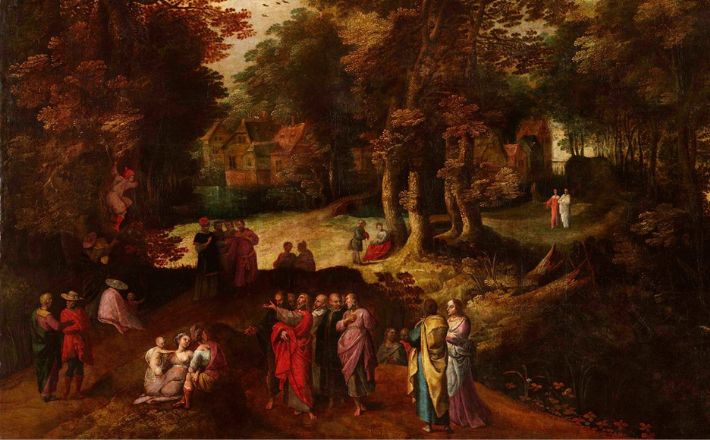Commentary on Luke 18:31—19:10
It is an unsettling feeling, when houseguests drop in. You don’t know where things are, are not sure things are clean, or aren’t sure what sort of dinner you can whip up with canned yams and ground beef. You feel unprepared, out of control, lost.
I wonder if that’s how Zacchaeus felt when Jesus invited himself over. I know Luke tells us that Zacchaeus was “happy” to climb down and welcome Jesus to his home. But—since Luke isn’t a mind reader—doesn’t that mean Zacchaeus looked happy?
It had already been a busy day for Zacchaeus. How did he know this particular rabbi was passing through town on this particular day? Maybe another tax collector tipped him off. It seems unlikely his neighbors would do it, given what they must have thought of him.
Tradition has it that Zacchaeus was a person of modest height. But the Greek word translated here as “short” has a range of meanings. It could mean short as in five foot two, or it could mean short in years, as in having all this money and power at the ripe old age of 22.
But either way, it’s hard to miss another, figurative sort of meaning. Whatever else we might say, Zacchaeus the tax collector is “short” on reputation. Short on integrity. Short on righteousness. Any of his neighbors will tell you so. And on the day Jesus comes to town, that is really the problem.
Why can’t Zacchaeus get a front-row seat along the parade route? Luke tells us: It is on account of the crowd. Even if Zacchaeus was on the small side, that still wouldn’t have been a big deal. Tall people usually let a shorter person come on down front so they can see. That’s just good manners. But no one wants him to see Jesus. He doesn’t deserve to see. That is the problem.
So Zacchaeus hikes up his robes, puffs over to the nearest tree, and clambers on up. It is not a dignified pose. But Zacchaeus doesn’t care. He just wants to see Jesus, there, from a safe distance. That is all.
What a shock it must be when Jesus stops, looks up, calls Zacchaeus by name, tells him to scramble down, and invites himself over for dinner. Himself and, presumably, his entire entourage. Right now.
Imagine how unfair this would seem to the rest of the community. People who know the truth about Zacchaeus the chief tax collector. People who know he is not worthy to receive such a guest in his house furnished with exploitation and betrayal. And they feel compelled to say so, there on the sidewalk in front of Zacchaeus’s estate. Just loud enough for Jesus to hear.
And Zacchaeus, hearing their words and knowing they are true, stops right there in the courtyard, tugs on Jesus’ sleeve, looks up at him with eager eyes, and makes a ridiculous promise.
“Half of all my wealth I will give to the beggars, and the ones I have cheated I will pay back four times over.”
This does not make any sense. If you give half your stuff to the poor, you only have half left.
And then you’re going to take that half and make up for years of wheeling and dealing? What on earth is going to be left over? Are Zacchaeus’s wife and kids leaning out of the mansion windows listening to this madness? This is a vow of poverty. This is going all in. This is betting the farm.
But when Zacchaeus makes this crazy promise about the future, Jesus does not reject it. Or question it. Or laugh it off, like the neighbors surely do. When Jesus turns to Zacchaeus and his eager eyes, he gladly hears his promise to do better.
But notice what he does then. Jesus ever so gently pries Zacchaeus’s gaze from the future and pulls him back to here and now. “Today salvation has come to this house,” Jesus says. This salvation comes before any alms have been distributed, before any restitution has been made, before Zacchaeus is ready.
And then Jesus turns and speaks to those neighbors pressing in all around, reminding them that Zacchaeus remains a son of Abraham. Jesus connects the salvation he announces not to Zacchaeus’s extravagant promise—but to his participation in a people who belong to God. He redirects the onlookers to God’s initiative, decision, and grace.
We don’t know much more about the rest of that unexpected visit. We don’t know everything they talked about over their wine late into the night. We don’t know what sort of dinner Zacchaeus managed to pull together with canned yams and ground beef. We just know that Jesus was there, even though everything wasn’t ready.
That’s good to remember when facing a difficult situation, I think. We will fail to live into our extravagant baptismal promises some days. We will be lost for the right words, the right actions, the right spirit some of the time. We will not always be prepared for the challenge ahead, but we will not be alone. For the Son of Man came to seek out and save the lost.
PRAYER OF THE DAY
Lord of the lost,
We are quick to judge and slow to accept those whom we consider lower than ourselves. But you show us the way of acceptance, forgiveness, and peace. We honor your name for teaching us to love, for the sake of the one who is the essence of love itself, Jesus Christ our loving Lord. Amen.
HYMNS
Jesus, I will ponder now ELW 345
God, whose giving knows no ending ELW 678, NCH 565
Let us ever walk with Jesus ELW 802
CHORAL
City called heaven, arr. Josephine Poelinitz


April 6, 2025